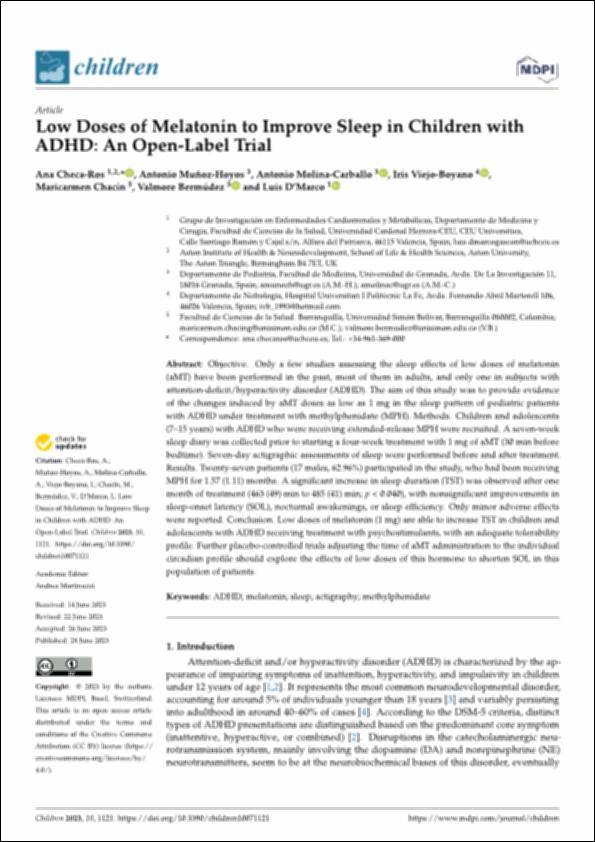Por favor, use este identificador para citar o enlazar este ítem:
http://hdl.handle.net/10637/16169Low doses of Melatonin to improve sleep in children with ADHD: an open-label trial
| Título : | Low doses of Melatonin to improve sleep in children with ADHD: an open-label trial |
| Autor : | Checa Ros, Ana Muñoz Hoyos, Antonio Molina Carballo, Antonio Viejo Boyano, Iris Chacín González, Maricarmen Bermúdez, Valmore D'Marco Gascón, Luis Gerardo |
| Materias: | Melatonina; Melatonin; Sueño; Sleep; Trastorno por Déficit de Atención con Hiperactividad (TDAH); Attention Deficit Hyperactivity Disorder (ADHD); Metilfenidato; Methylphenidate; Tratamiento médico; Medical treatment; Medicamento; Drugs |
| Editorial : | MDPI |
| Citación : | Checa-Ros, A., Muñoz-Hoyos, A., Molina-Carballo, A., Viejo-Boyano, I., Chacín, M., Bermúdez, V. & D’Marco, L. (2023). Low doses of Melatonin to improve sleep in children with ADHD: an open-label trial. Children, vol. 10, i. 7, art. 1121 (28 jun.). DOI: https://doi.org/10.3390/children10071121 |
| Resumen : | Objective. Only a few studies assessing the sleep effects of low doses of melatonin (aMT) have been performed in the past, most of them in adults, and only one in subjects with attention-deficit/hyperactivity disorder (ADHD). The aim of this study was to provide evidence of the changes induced by aMT doses as low as 1 mg in the sleep pattern of pediatric patients with ADHD under treatment with methylphenidate (MPH). Methods. Children and adolescents (7–15 years) with ADHD who were receiving extended-release MPH were recruited. A seven-week sleep diary was collected prior to starting a four-week treatment with 1 mg of aMT (30 min before bedtime). Seven-day actigraphic assessments of sleep were performed before and after treatment. Results. Twenty-seven patients (17 males, 62.96%) participated in the study, who had been receiving MPH for 1.57 (1.11) months. A significant increase in sleep duration (TST) was observed after one month of treatment (463 (49) min to 485 (41) min; p < 0.040), with nonsignificant improvements in sleep-onset latency (SOL), nocturnal awakenings, or sleep efficiency. Only minor adverse effects were reported. Conclusion. Low doses of melatonin (1 mg) are able to increase TST in children and adolescents with ADHD receiving treatment with psychostimulants, with an adequate tolerability profile. Further placebo-controlled trials adjusting the time of aMT administration to the individual circadian profile should explore the effects of low doses of this hormone to shorten SOL in this population of patients. |
| Descripción : | Este artículo pertenece al número especial "Sleep Disorders in Children: Presentation, Early Identification and Treatment". |
| URI : | http://hdl.handle.net/10637/16169 |
| Derechos: | http://creativecommons.org/licenses/by/4.0/deed.es Open Access |
| ISSN : | 2227-9067 (Electrónico) |
| Fecha de publicación : | 28-jun-2023 |
| Centro : | Universidad Cardenal Herrera-CEU |
| Aparece en las colecciones: | Dpto. Medicina y Cirugía |
Los ítems de DSpace están protegidos por copyright, con todos los derechos reservados, a menos que se indique lo contrario.


